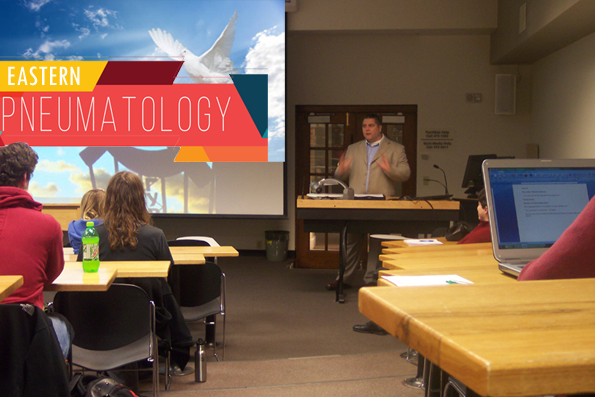The Non-Chalcedonian Eastern Church: Armenian

Dony K. Donev, D.Min.: Eastern Pneumotology Lectures
Eastern Orthodoxy can be expressed in one word: theism. The purpose and meaning of life is to become more like God. Deification is pursued by all means of human existence. This quest for divine likeness often includes the typical for the Eastern Church, speculation on the divinity and humanity of Christ, traditions on the doctrine of the Trinity and non-traditional mystical experiences. They appear in the context of both physical and spiritual characteristics in individual and corporate ecclesiastical environment. The role of the Spirit in the process of deification is threefold and involves: creation, re-creation and theism. Eastern Pneumotology follows the graduate process of theism development. The Spirit is involved in the original creation of the world as well as the new-birth experience. His work however, does not end there, but continues throughout the process of personal deification of the believer.
The Non-Chalcedonian Eastern Church: Armenian
The Armenian Church claims to be found by St. Bartholomew in the midst of the first century.[1] The Armenian faith practices focused on preservation of the apostolic doctrines and habits. In this act it links its story with history and remains not only a discoverer, but also a preserver and a carrier of the past Christian tradition.[2]
Remarkable remains the role of the Holy Spirit in the liturgy of the Armenian tradition. A prime example is the number of congregational songs dedicated to the Holy Spirit, in which the Spirit: (1) descended from heaven upon the apostles, (2) filled them all, (3) arming them with “fire by miracle,” (4) giving them “diverse tongues,” (5) and “manifold gifts.”[3] Because of the hardship in its long history, the Armenian Church has developed an extraordinary pneumatic heritage.
An Armenian apostle, patron and national saint by the name of Gregory the Illuminator (ca. 240-325), led the restoration of the Armenian Church. His studies were focused on the theology of the Holy Spirit and catechism shows examples of deep and concentrated pneumatic research.
For example, he includes a study of the Holy Spirit in both the Old and the New Testaments. In the former, He is present in the band of the prophets, as a sign of their office.[4] In the later, He is present in the baptism of Christ signifying His purity and sinlessness.[5]
In this context, Gregory the Illuminator describes the Spirit is described as a furnace, which burns sin away.[6] Fire is the sanctifying agent of the Spirit.[7] Only after the twelve were led through the fire experience, they received divine knowledge and supernatural interpretation of the Old Testament prophesies, in order to reveal the mysteries of the Word.[8]
Similar view in this tradition holds Gregory Narek (ca. 950-ca. 1010), who claims that the Spirit pardons our sins, and thus gives birth of the Church.[9] He further states that the Spirit equips the Church with both spiritual gifts and fruits, which coexist only in the ecclesiastical environment.[10] Interesting in this context is his description of “intoxicating joy” through which he comes close to a number of experiences from different cultural and ethnical settings among which the already discussed Seraphim Sarov and Narsai.[11]
[1] Eusebius, Ecclesiastical History 1.13 in NPF 2nd Series, 1:100-2.
[2] Burgess, 113.
[3] Ibid., 115-16.
[4] Gregory the Illuminator, Cathehism parag. 502., in Robert W. Thomson, ed., The Teachings of St. Gregory: An Early Armenian Catechism (Cambridge: Harvard University Press, 1970)., 116.
[5] Gregory the Illuminator, Cathehism parag. 418, 420; Thomson, Teaching, 91.
[6] Gregory the Illuminator, Cathehism parag. 682; Thomson, Teaching, 170.
[7] Gregory the Illuminator, Cathehism parag. 676; Thomson, Teaching, 168.
[8] Gregory the Illuminator, Cathehism parag. 661-63, 672; Thomson, Teaching, 164-65, 167.
[9] Robert W. Thompson, “Gregory of Narek’s Commentary on the Song of Songs,” Journal of Theological Studies, n.s., 43:2 (October 1983): 453-96, 6.8, 7.13, 8.5; Thompson 484, 490-92.
[10] Mischa Kudian, Lamentations of Nerek: Mystic Soliloquies with God (London: Mashtots Press, 1977), 3.1, 15.1.
[11] Thompson, “Song of Songs,” 4.10.







